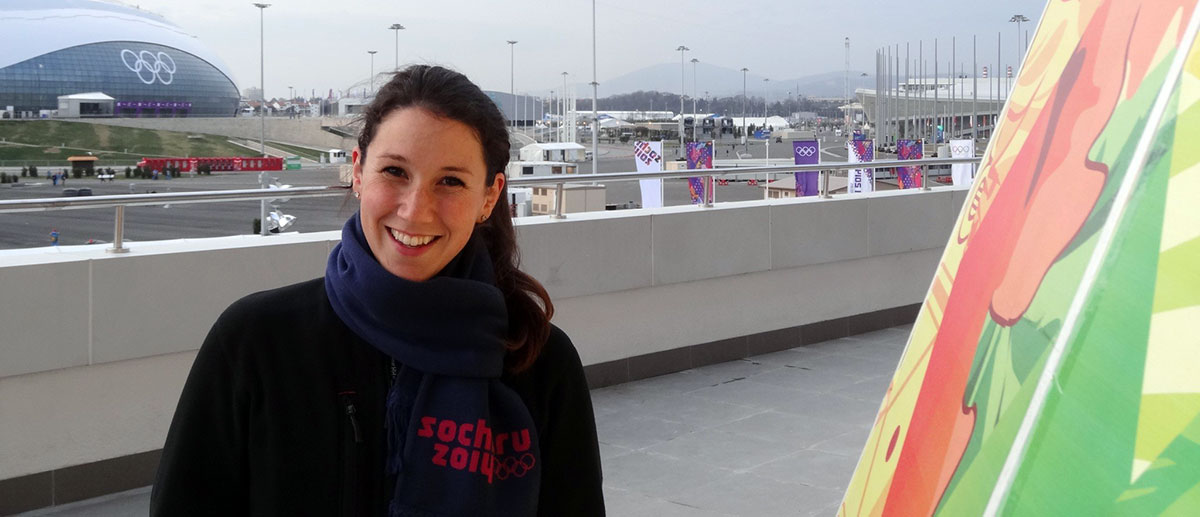When the 2014 Olympic Winter Games in Sochi, Russia, opened February 7, UT alumna Stephanie Garant-Jones was backstage, helping the extravaganza unfold before the world.
Garant-Jones, who earned a master’s degree in sport management in 2007, is part of the crew orchestrating the opening and closing ceremonies. Her job is to ensure that the 3,000 cast members have the technology needed to communicate with producers throughout the shows.
“When the cauldron is lit, I will be backstage somewhere, with goose bumps due to the sheer uniqueness of the moment,” she said before the games began.
This is Garant-Jones’s third Olympics. She worked in the Olympic Village at the 2010 Winter Games in Vancouver. She managed the competition venues for road cycling, the marathon, race walking, and the Paralympic marathon at the 2012 Summer Games in London.
“When I was offered the chance to be involved in the opening and closing ceremonies in Sochi, I jumped at the opportunity,” she said.
Garant-Jones has been in Sochi since November, and the experience has exceeded her highest expectations.
“It is truly mesmerizing to see the ceremonies evolve to production,” she said. “My co-workers include people who have worked on the Super Bowl, the Oscars, the biggest rock tours in the world, and Cirque du Soleil. Some of them come from the world’s top dance and ballet schools and theaters.
Garant-Jones is also assisted by young Russian volunteers from a Sochi university.
The road to Sochi
 Garant-Jones was born in Chandler, Quebec, Canada.
Garant-Jones was born in Chandler, Quebec, Canada.
As a junior at Brock University in Ontario, Canada, she came to UT through an exchange program. She loved UT so much she stayed for graduate school.
“I come from a family who loved the great outdoors, loved sports, and lived passionately. My family has always been incredibly supportive of my decisions, including moving to Tennessee to attend an American university with an incredible athletic program,” she said.
During her final year of graduate school, she travelled to Beijing, China, with a group of UT faculty, staff, and students to teach in the Summer English Camp at Tsinghua University. There, she got to know several people who were going to be working at the 2008 Summer Games and was able to visit Olympic venues in Beijing.
“My dream of working at the 2010 Winter Games had been alive well before my experience in Beijing,” she said. “When I got home, I started knocking on doors. After a lot of e-mails, networking, and after taking many chances, I was hired to help manage the Olympic Village at the Vancouver games.
“My job was to help ensure the athletes had a home away from home, and to make sure they didn’t have to worry about where to eat or how to travel to training so they could focus strictly on the competition.”
[callout]Once the 2010 Winter Games were complete, Garant-Jones set her sights on London.[/callout]
“This time, I wanted to work in a sports venue,” she said. “I wanted to experience the Olympics from central London. I love the city. I love road cycling, big crowds, and gut-wrenching finish-line photos.”
Thanks to the contacts she’d made in Vancouver, she was hired as venue operations manager for road events.
“At UT, sport management students are taught time and time again that the most important thing one can do for their career is network,” she said. “That is the utmost truth.”
The two-year job involved everything “from working with media and broadcast people—I got to have a meeting with Al Michaels!—to anti-doping, to spectator services, to transport, and to the sport itself.
“I got to present our operational plan at Buckingham Palace. I got to sit through meetings at Whitehall and at 10 Downing Street, the Prime Minister’s office. I got to walk Prince Charles through to the start line of the men’s cycling race.”
It was exciting but stressful work with long hours, challenging tasks, and last-minute changes.
“But when you see someone’s dream of winning an Olympic medal come … it is indescribably incredible,” she said.
Garant-Jones said she has hundreds of stories from London, but one is really special.
“I was standing on the sidelines when one of the medal winners’ fathers jumped the fence to get as close as possible to the podium. Normally, I would have had the spectator escorted away, but at this moment, I was standing with a very large Norwegian man, holding him as he cried while he watched his son receive the medal. I still cry thinking about it.”
Sochi

Garant-Jones
Despite the great time she had in Vancouver and London, Garant-Jones was unsure if she wanted to work at the Winter Games in Sochi.
[callout]She was concerned about safety and terrorism threats. She was uncomfortable with Russia’s laws and regulations regarding homosexuality and human rights.[/callout]
“I did a lot of soul-searching and spoke to individuals whose advice I often heed, including Dr. Joy DeSensi at UT,” she said. DeSensi is associate dean of the Graduate School and a professor in the Department of Kinesiology, Recreation, and Sport Studies.
Now, Garant-Jones is incredibly glad she decided to go to Sochi.
“My Russian colleagues and volunteers are simply the kindest individuals I have ever met,” she said. “I have had the chance to talk to them about the serious topics surrounding these Olympics. It has been very interesting to hear their thoughts. I have learned that when you come to someone else’s country, and when you work in someone else’s city, you cannot expect things to change simply because you are there.
“I have embraced every moment I’ve spent in Russia. No matter the challenges, I would never trade this experience,” she said. “While the Olympics are about sporting prowess and defining moments, they are, in a larger sense, about the world coming together.”

